Histone H3 (Acetyl Lys9) Polyclonal Antibody
- 货号:YK0006
- 应用:WB;IHC;IF;ELISA
- 种属:Human;Mouse;Rat
- 靶点:
- Histone H3
- 简介:
- >>Neutrophil extracellular trap formation;>>Alcoholism;>>Shigellosis;>>Transcriptional misregulation in cancer;>>Systemic lupus erythematosus
- 基因名称:
- HIST1H3A/HIST1H3B/HIST1H3C/HIST1H3D/HIST1H3E/HIST1H3F/HIST1H3G/HIST1H3H/HIST1H3I/HIST1H3J/HIST2H3A/HIST2H3C/HIST2H3D/H3F3A/H3F3B
- 蛋白名称:
- Histone H3.1/Histone H3.2/Histone H3.3
- Human Swiss Prot No:
- P68431/Q71DI3/P84243
- Mouse Gene Id:
- 319152/15077/15078
- Rat Gene Id:
- 291159/100361558
- Rat Swiss Prot No:
- Q6LED0/P84245
- 免疫原:
- The antiserum was produced against synthesized peptide derived from human Histone H3 around the acetylated site of Lys9. AA range:3-52
- 特异性:
- Acetyl-Histone H3 (K9) Polyclonal Antibody detects endogenous levels of Histone H3 protein only when acetylated at K9.
- 组成:
- Liquid in PBS containing 50% glycerol, 0.5% BSA and 0.02% sodium azide.
- 来源:
- Polyclonal, Rabbit,IgG
- 稀释:
- WB 1:500-2000, IHC 1:50-300, IF 1:50-300
- 纯化工艺:
- The antibody was affinity-purified from rabbit antiserum by affinity-chromatography using epitope-specific immunogen.
- 浓度:
- 1 mg/ml
- 储存:
- -15°C to -25°C/1 year(Do not lower than -25°C)
- 其他名称:
- HIST1H3A;H3FA;HIST1H3B;H3FL;HIST1H3C;H3FC;HIST1H3D;H3FB;HIST1H3E;H3FD;HIST1H3F;H3FI;HIST1H3G;H3FH;HIST1H3H;H3FK;HIST1H3I;H3FF;HIST1H3J;H3FJ;Histone H3.1;Histone H3/a;Histone H3/b;Histone H3/c;Histone H3/d;Histone H3;H3k9AC
- 实测条带:
- 17kD
- 背景:
- Histones are basic nuclear proteins that are responsible for the nucleosome structure of the chromosomal fiber in eukaryotes. This structure consists of approximately 146 bp of DNA wrapped around a nucleosome, an octamer composed of pairs of each of the four core histones (H2A, H2B, H3, and H4). The chromatin fiber is further compacted through the interaction of a linker histone, H1, with the DNA between the nucleosomes to form higher order chromatin structures. This gene is intronless and encodes a replication-dependent histone that is a member of the histone H3 family. Transcripts from this gene lack polyA tails; instead, they contain a palindromic termination element. This gene is found in the large histone gene cluster on chromosome 6p22-p21.3. [provided by RefSeq, Aug 2015],
- 功能:
- caution:Was originally (PubMed:2587222) thought to originate from mouse.,developmental stage:Expressed during S phase, then expression strongly decreases as cell division slows down during the process of differentiation.,function:Core component of nucleosome. Nucleosomes wrap and compact DNA into chromatin, limiting DNA accessibility to the cellular machineries which require DNA as a template. Histones thereby play a central role in transcription regulation, DNA repair, DNA replication and chromosomal stability. DNA accessibility is regulated via a complex set of post-translational modifications of histones, also called histone code, and nucleosome remodeling.,mass spectrometry:Monoisotopic with N-acetylserine PubMed:16457589,miscellaneous:This histone is only present in mammals and is enriched in acetylation of Lys-15 and dimethylation of Lys-10 (H3K9me2).,PTM:Acetylation is generally l
- 细胞定位:
- Nucleus. Chromosome.
- 组织表达:
- Blood,Epithelium,Kidney,Lung,Ovary,Spleen,Uterus,
Differential gene regulatory plasticity between upper and lower layer cortical excitatory neurons. MOLECULAR AND CELLULAR NEUROSCIENCE 2018 May 23 WB Mouse brain
货号:YK0006
The elevated transcription of ADAM19 by the oncohistone H2BE76K contributes to oncogenic properties in breast cancer. JOURNAL OF BIOLOGICAL CHEMISTRY 2021 Jan;296: WB Human 293T cell,MDA-MB-231 cell
货号:YK0006
As a Histone Deacetylase Inhibitor, γ‐Aminobutyric Acid Upregulates GluR2 Expression: An In Vitro and In Vivo Study. MOLECULAR NUTRITION & FOOD RESEARCH Mol Nutr Food Res. 2019 Sep;63(17):1900001 WB Mouse,Human 1: 200 Cerebral Cortex SH-SY5Y cell, 3T3-L1 Cell
货号:YK0006
Intermittent Fasting Alleviates the Increase of Lipoprotein Lipase Expression in Brain of a Mouse Model of Alzheimer's Disease: Possibly Mediated by β-hydroxybutyrate. Frontiers in Cellular Neuroscience 2018 Jan 17 WB Human,Mouse 1:200,1:200 Cortex SH-SY5Y cell
货号:YK0006
Up-regulation of neprilysin mediates the protection of fructo-oligosaccharides against Alzheimer's disease. Food & Function Food Funct. 2020 Jul;11(7):6565-6572 WB Mouse,Human 1:200 Cerebral cortex SH-SY5Ycell
货号:YK0006
Association between human cytomegalovirus infection and histone acetylation level in various histological types of glioma. Oncology Letters Oncol Lett. 2015 Nov;10(5):2812-2820 IHC Human 1:200 glioblastoma, anaplastic astrocytoma, low-grade gloma ,normal cortex tissues
货号:YK0006
Chen, Li, Zhigang Miao, and Xingshun Xu. "β-hydroxybutyrate alleviates depressive behaviors in mice possibly by increasing the histone3-lysine9-β-hydroxybutyrylation." Biochemical and biophysical research communications 490.2 (2017): 117-122.
货号:YK0006
As an HDAC Inhibitor, GABA Upregulates GluR2 Expression: A Study of In Vitro and In Vivo." Molecular Nutrition & Food Research: 1900001.
货号:YK0006
Differential gene regulatory plasticity between upper and lower layer cortical excitatory neurons. MOLECULAR AND CELLULAR NEUROSCIENCE 2018 May 23 WB Mouse brain
货号:YK0006
The elevated transcription of ADAM19 by the oncohistone H2BE76K contributes to oncogenic properties in breast cancer. JOURNAL OF BIOLOGICAL CHEMISTRY 2021 Jan;296: WB Human 293T cell,MDA-MB-231 cell
货号:YK0006
Glycochenodeoxycholate Affects Iron Homeostasis via Up-Regulating Hepcidin Expression Nutrients Long-jiao Wang WB Human,Mouse
货号:YK0006
- June 19-2018
- WESTERN IMMUNOBLOTTING PROTOCOL
- June 19-2018
- IMMUNOHISTOCHEMISTRY-PARAFFIN PROTOCOL
- June 19-2018
- IMMUNOFLUORESCENCE PROTOCOL
- September 08-2020
- FLOW-CYTOMEYRT-PROTOCOL
- May 20-2022
- Cell-Based ELISA│解您多样本WB检测之困扰
- July 13-2018
- CELL-BASED-ELISA-PROTOCOL-FOR-ACETYL-PROTEIN
- July 13-2018
- CELL-BASED-ELISA-PROTOCOL-FOR-PHOSPHO-PROTEIN
- July 13-2018
- Antibody-FAQs
- 产品图片
.jpg)
- Kang, Tze Zhen Evangeline, et al. "The elevated transcription of ADAM19 by the oncohistone H2BE76K contributes to oncogenic properties in breast cancer." Journal of Biological Chemistry 296 (2021).
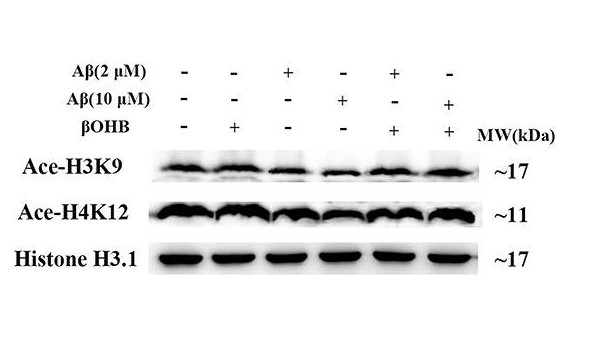
- Zhang, Jingzhu, et al. "Intermittent Fasting Alleviates the Increase of Lipoprotein Lipase Expression in Brain of a Mouse Model of Alzheimer's Disease: Possibly Mediated by β-hydroxybutyrate." Frontiers in cellular neuroscience 12 (2018): 1.
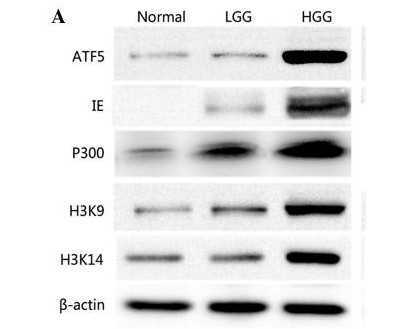
- Huang, Rui, et al. "Association between human cytomegalovirus infection and histone acetylation level in various histological types of glioma." Oncology letters 10.5 (2015): 2812-2820.
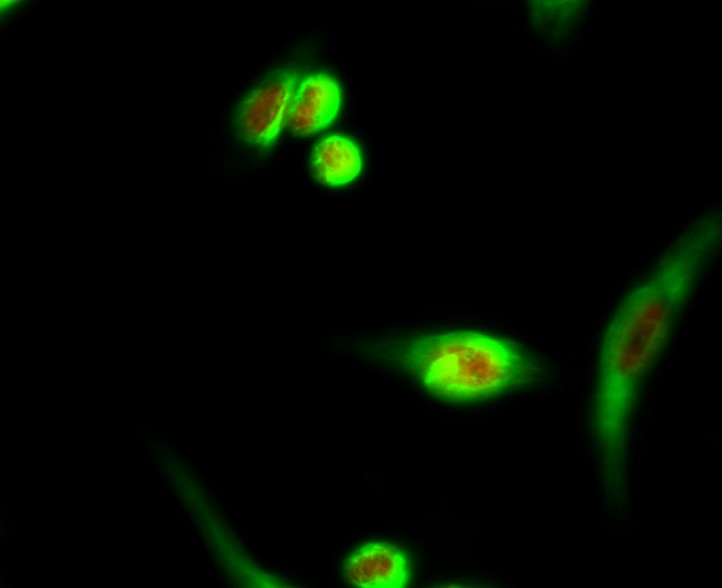
- Immunofluorescence analysis of Hela cell. 1,Histone H3 (Acetyl Lys9) Polyclonal Antibody(red) was diluted at 1:200(4° overnight). MICU1 Monoclonal Antibody(Mix)(green) was diluted at 1:200(4° overnight). 2, Goat Anti Rabbit Alexa Fluor 594 Catalog:RS3611 was diluted at 1:1000(room temperature, 50min). Goat Anti Mouse Alexa Fluor 488 Catalog:RS3208 was diluted at 1:1000(room temperature, 50min).
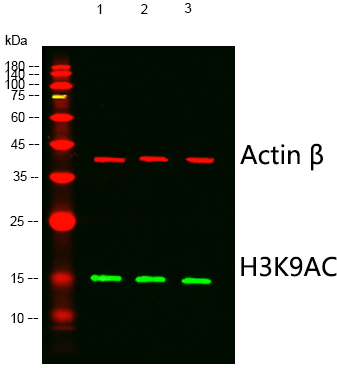
- Western blot analysis of lysates from 1) Hela ,2) MCF-7,3) 3T3 cells, (Green) primary antibody was diluted at 1:1000, 4°over night, Dylight 800 secondary antibody(Immunoway:RS23920)was diluted at 1:10000, 37° 1hour. (Red) Actin β Monoclonal Antibody(5B7) (Immunoway:YM3028) antibody was diluted at 1:5000 as loading control, 4° over night,Dylight 680 secondary antibody(Immunoway:RS23710)was diluted at 1:10000, 37° 1hour.
poly-ihc-human-uterus.jpg)
- Immunohistochemical analysis of paraffin-embedded Human-uterus tissue. 1,Histone H3 (Acetyl Lys9) Polyclonal Antibody was diluted at 1:200(4°C,overnight). 2, Sodium citrate pH 6.0 was used for antibody retrieval(>98°C,20min). 3,Secondary antibody was diluted at 1:200(room tempeRature, 30min). Negative control was used by secondary antibody only.
poly-ihc-human-uterus-cancer.jpg)
- Immunohistochemical analysis of paraffin-embedded Human-uterus-cancer tissue. 1,Histone H3 (Acetyl Lys9) Polyclonal Antibody was diluted at 1:200(4°C,overnight). 2, Sodium citrate pH 6.0 was used for antibody retrieval(>98°C,20min). 3,Secondary antibody was diluted at 1:200(room tempeRature, 30min). Negative control was used by secondary antibody only.
poly-ihc-human-tonsil.jpg)
- Immunohistochemical analysis of paraffin-embedded Human-Tonsil tissue. 1,Histone H3 (Acetyl Lys9) Polyclonal Antibody was diluted at 1:200(4°C,overnight). 2, Sodium citrate pH 6.0 was used for antibody retrieval(>98°C,20min). 3,Secondary antibody was diluted at 1:200(room tempeRature, 30min). Negative control was used by secondary antibody only.
poly-ihc-human-colon.jpg)
- Immunohistochemical analysis of paraffin-embedded Human-colon tissue. 1,Histone H3 (Acetyl Lys9) Polyclonal Antibody was diluted at 1:200(4°C,overnight). 2, Sodium citrate pH 6.0 was used for antibody retrieval(>98°C,20min). 3,Secondary antibody was diluted at 1:200(room tempeRature, 30min). Negative control was used by secondary antibody only.
poly-ihc-human-colon-cancer.jpg)
- Immunohistochemical analysis of paraffin-embedded Human-colon-cancer tissue. 1,Histone H3 (Acetyl Lys9) Polyclonal Antibody was diluted at 1:200(4°C,overnight). 2, Sodium citrate pH 6.0 was used for antibody retrieval(>98°C,20min). 3,Secondary antibody was diluted at 1:200(room tempeRature, 30min). Negative control was used by secondary antibody only.
poly-ihc-human-liver.jpg)
- Immunohistochemical analysis of paraffin-embedded Human-liver tissue. 1,Histone H3 (Acetyl Lys9) Polyclonal Antibody was diluted at 1:200(4°C,overnight). 2, Sodium citrate pH 6.0 was used for antibody retrieval(>98°C,20min). 3,Secondary antibody was diluted at 1:200(room tempeRature, 30min). Negative control was used by secondary antibody only.
poly-ihc-human-liver-cancer.jpg)
- Immunohistochemical analysis of paraffin-embedded Human-liver-cancer tissue. 1,Histone H3 (Acetyl Lys9) Polyclonal Antibody was diluted at 1:200(4°C,overnight). 2, Sodium citrate pH 6.0 was used for antibody retrieval(>98°C,20min). 3,Secondary antibody was diluted at 1:200(room tempeRature, 30min). Negative control was used by secondary antibody only.
poly-ihc-human-lung.jpg)
- Immunohistochemical analysis of paraffin-embedded Human-lung tissue. 1,Histone H3 (Acetyl Lys9) Polyclonal Antibody was diluted at 1:200(4°C,overnight). 2, Sodium citrate pH 6.0 was used for antibody retrieval(>98°C,20min). 3,Secondary antibody was diluted at 1:200(room tempeRature, 30min). Negative control was used by secondary antibody only.
poly-ihc-human-stomach.jpg)
- Immunohistochemical analysis of paraffin-embedded Human-stomach tissue. 1,Histone H3 (Acetyl Lys9) Polyclonal Antibody was diluted at 1:200(4°C,overnight). 2, Sodium citrate pH 6.0 was used for antibody retrieval(>98°C,20min). 3,Secondary antibody was diluted at 1:200(room tempeRature, 30min). Negative control was used by secondary antibody only.
poly-ihc-human-stomach-cancer.jpg)
- Immunohistochemical analysis of paraffin-embedded Human-stomach-cancer tissue. 1,Histone H3 (Acetyl Lys9) Polyclonal Antibody was diluted at 1:200(4°C,overnight). 2, Sodium citrate pH 6.0 was used for antibody retrieval(>98°C,20min). 3,Secondary antibody was diluted at 1:200(room tempeRature, 30min). Negative control was used by secondary antibody only.
poly-ihc-human-appendix.jpg)
- Immunohistochemical analysis of paraffin-embedded Human-Appendix tissue. 1,Histone H3 (Acetyl Lys9) Polyclonal Antibody was diluted at 1:200(4°C,overnight). 2, Sodium citrate pH 6.0 was used for antibody retrieval(>98°C,20min). 3,Secondary antibody was diluted at 1:200(room tempeRature, 30min). Negative control was used by secondary antibody only.
poly-ihc-rat-heart.jpg)
- Immunohistochemical analysis of paraffin-embedded Rat-heart tissue. 1,Histone H3 (Acetyl Lys9) Polyclonal Antibody was diluted at 1:200(4°C,overnight). 2, Sodium citrate pH 6.0 was used for antibody retrieval(>98°C,20min). 3,Secondary antibody was diluted at 1:200(room tempeRature, 30min). Negative control was used by secondary antibody only.
poly-ihc-rat-testis.jpg)
- Immunohistochemical analysis of paraffin-embedded Rat-testis tissue. 1,Histone H3 (Acetyl Lys9) Polyclonal Antibody was diluted at 1:200(4°C,overnight). 2, Sodium citrate pH 6.0 was used for antibody retrieval(>98°C,20min). 3,Secondary antibody was diluted at 1:200(room tempeRature, 30min). Negative control was used by secondary antibody only.
poly-ihc-rat-liver.jpg)
- Immunohistochemical analysis of paraffin-embedded Rat-liver tissue. 1,Histone H3 (Acetyl Lys9) Polyclonal Antibody was diluted at 1:200(4°C,overnight). 2, Sodium citrate pH 6.0 was used for antibody retrieval(>98°C,20min). 3,Secondary antibody was diluted at 1:200(room tempeRature, 30min). Negative control was used by secondary antibody only.
poly-ihc-rat-lung.jpg)
- Immunohistochemical analysis of paraffin-embedded Rat-lung tissue. 1,Histone H3 (Acetyl Lys9) Polyclonal Antibody was diluted at 1:200(4°C,overnight). 2, Sodium citrate pH 6.0 was used for antibody retrieval(>98°C,20min). 3,Secondary antibody was diluted at 1:200(room tempeRature, 30min). Negative control was used by secondary antibody only.
poly-ihc-rat-kidney.jpg)
- Immunohistochemical analysis of paraffin-embedded Rat-kidney tissue. 1,Histone H3 (Acetyl Lys9) Polyclonal Antibody was diluted at 1:200(4°C,overnight). 2, Sodium citrate pH 6.0 was used for antibody retrieval(>98°C,20min). 3,Secondary antibody was diluted at 1:200(room tempeRature, 30min). Negative control was used by secondary antibody only.
poly-ihc-rat-spinal-cord.jpg)
- Immunohistochemical analysis of paraffin-embedded Rat-spinal-cord tissue. 1,Histone H3 (Acetyl Lys9) Polyclonal Antibody was diluted at 1:200(4°C,overnight). 2, Sodium citrate pH 6.0 was used for antibody retrieval(>98°C,20min). 3,Secondary antibody was diluted at 1:200(room tempeRature, 30min). Negative control was used by secondary antibody only.
poly-ihc-rat-brain.jpg)
- Immunohistochemical analysis of paraffin-embedded Rat-brain tissue. 1,Histone H3 (Acetyl Lys9) Polyclonal Antibody was diluted at 1:200(4°C,overnight). 2, Sodium citrate pH 6.0 was used for antibody retrieval(>98°C,20min). 3,Secondary antibody was diluted at 1:200(room tempeRature, 30min). Negative control was used by secondary antibody only.
poly-ihc-mouse-heart.jpg)
- Immunohistochemical analysis of paraffin-embedded Mouse-heart tissue. 1,Histone H3 (Acetyl Lys9) Polyclonal Antibody was diluted at 1:200(4°C,overnight). 2, Sodium citrate pH 6.0 was used for antibody retrieval(>98°C,20min). 3,Secondary antibody was diluted at 1:200(room tempeRature, 30min). Negative control was used by secondary antibody only.
poly-ihc-mouse-testis.jpg)
- Immunohistochemical analysis of paraffin-embedded Mouse-testis tissue. 1,Histone H3 (Acetyl Lys9) Polyclonal Antibody was diluted at 1:200(4°C,overnight). 2, Sodium citrate pH 6.0 was used for antibody retrieval(>98°C,20min). 3,Secondary antibody was diluted at 1:200(room tempeRature, 30min). Negative control was used by secondary antibody only.
poly-ihc-mouse-liver.jpg)
- Immunohistochemical analysis of paraffin-embedded Mouse-liver tissue. 1,Histone H3 (Acetyl Lys9) Polyclonal Antibody was diluted at 1:200(4°C,overnight). 2, Sodium citrate pH 6.0 was used for antibody retrieval(>98°C,20min). 3,Secondary antibody was diluted at 1:200(room tempeRature, 30min). Negative control was used by secondary antibody only.
poly-ihc-mouse-colon.jpg)
- Immunohistochemical analysis of paraffin-embedded Mouse-colon tissue. 1,Histone H3 (Acetyl Lys9) Polyclonal Antibody was diluted at 1:200(4°C,overnight). 2, Sodium citrate pH 6.0 was used for antibody retrieval(>98°C,20min). 3,Secondary antibody was diluted at 1:200(room tempeRature, 30min). Negative control was used by secondary antibody only.
poly-ihc-mouse-lung.jpg)
- Immunohistochemical analysis of paraffin-embedded Mouse-lung tissue. 1,Histone H3 (Acetyl Lys9) Polyclonal Antibody was diluted at 1:200(4°C,overnight). 2, Sodium citrate pH 6.0 was used for antibody retrieval(>98°C,20min). 3,Secondary antibody was diluted at 1:200(room tempeRature, 30min). Negative control was used by secondary antibody only.
poly-ihc-mouse-kidney.jpg)
- Immunohistochemical analysis of paraffin-embedded Mouse-kidney tissue. 1,Histone H3 (Acetyl Lys9) Polyclonal Antibody was diluted at 1:200(4°C,overnight). 2, Sodium citrate pH 6.0 was used for antibody retrieval(>98°C,20min). 3,Secondary antibody was diluted at 1:200(room tempeRature, 30min). Negative control was used by secondary antibody only.
poly-ihc-mouse-brain.jpg)
- Immunohistochemical analysis of paraffin-embedded Mouse-brain tissue. 1,Histone H3 (Acetyl Lys9) Polyclonal Antibody was diluted at 1:200(4°C,overnight). 2, Sodium citrate pH 6.0 was used for antibody retrieval(>98°C,20min). 3,Secondary antibody was diluted at 1:200(room tempeRature, 30min). Negative control was used by secondary antibody only.
poly-ihc-mouse-spleen.jpg)
- Immunohistochemical analysis of paraffin-embedded Mouse-spleen tissue. 1,Histone H3 (Acetyl Lys9) Polyclonal Antibody was diluted at 1:200(4°C,overnight). 2, Sodium citrate pH 6.0 was used for antibody retrieval(>98°C,20min). 3,Secondary antibody was diluted at 1:200(room tempeRature, 30min). Negative control was used by secondary antibody only.
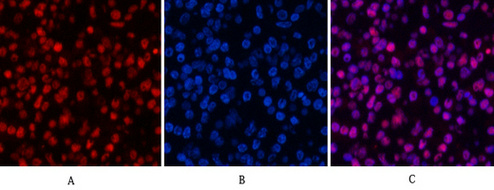
- Immunofluorescence analysis of Human-lung-cancer tissue. 1,Histone H3 (Acetyl Lys9) Polyclonal Antibody(red) was diluted at 1:200(4°C,overnight). 2, Cy3 labled Secondary antibody was diluted at 1:300(room temperature, 50min).3, Picture B: DAPI(blue) 10min. Picture A:Target. Picture B: DAPI. Picture C: merge of A+B
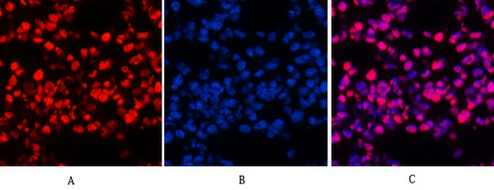
- Immunofluorescence analysis of Mouse-lung tissue. 1,Histone H3 (Acetyl Lys9) Polyclonal Antibody(red) was diluted at 1:200(4°C,overnight). 2, Cy3 labled Secondary antibody was diluted at 1:300(room temperature, 50min).3, Picture B: DAPI(blue) 10min. Picture A:Target. Picture B: DAPI. Picture C: merge of A+B
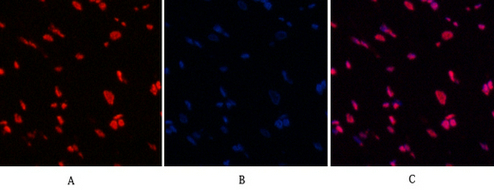
- Immunofluorescence analysis of Rat-heart tissue. 1,Histone H3 (Acetyl Lys9) Polyclonal Antibody(red) was diluted at 1:200(4°C,overnight). 2, Cy3 labled Secondary antibody was diluted at 1:300(room temperature, 50min).3, Picture B: DAPI(blue) 10min. Picture A:Target. Picture B: DAPI. Picture C: merge of A+B
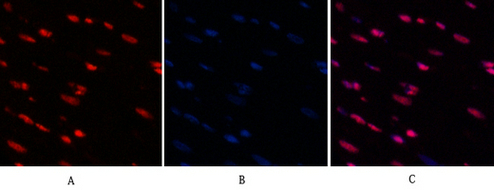
- Immunofluorescence analysis of Rat-heart tissue. 1,Histone H3 (Acetyl Lys9) Polyclonal Antibody(red) was diluted at 1:200(4°C,overnight). 2, Cy3 labled Secondary antibody was diluted at 1:300(room temperature, 50min).3, Picture B: DAPI(blue) 10min. Picture A:Target. Picture B: DAPI. Picture C: merge of A+B
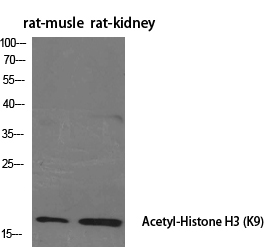
- Western Blot analysis of various cells using Acetyl-Histone H3 (K9) Polyclonal Antibody diluted at 1:2000. Secondary antibody(catalog#:RS0002) was diluted at 1:20000
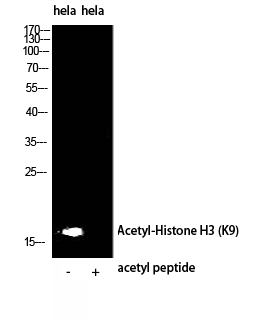
- Western Blot analysis of hela using Acetyl-Histone H3 (K9) Polyclonal Antibody. Antibody was diluted at 1:2000. Secondary antibody(catalog#:RS0002) was diluted at 1:20000

- Western blot analysis of 293T mouse-spleen lysis using Acetyl-Histone H3 (K9) antibody. Antibody was diluted at 1:2000. Secondary antibody(catalog#:RS0002) was diluted at 1:20000



